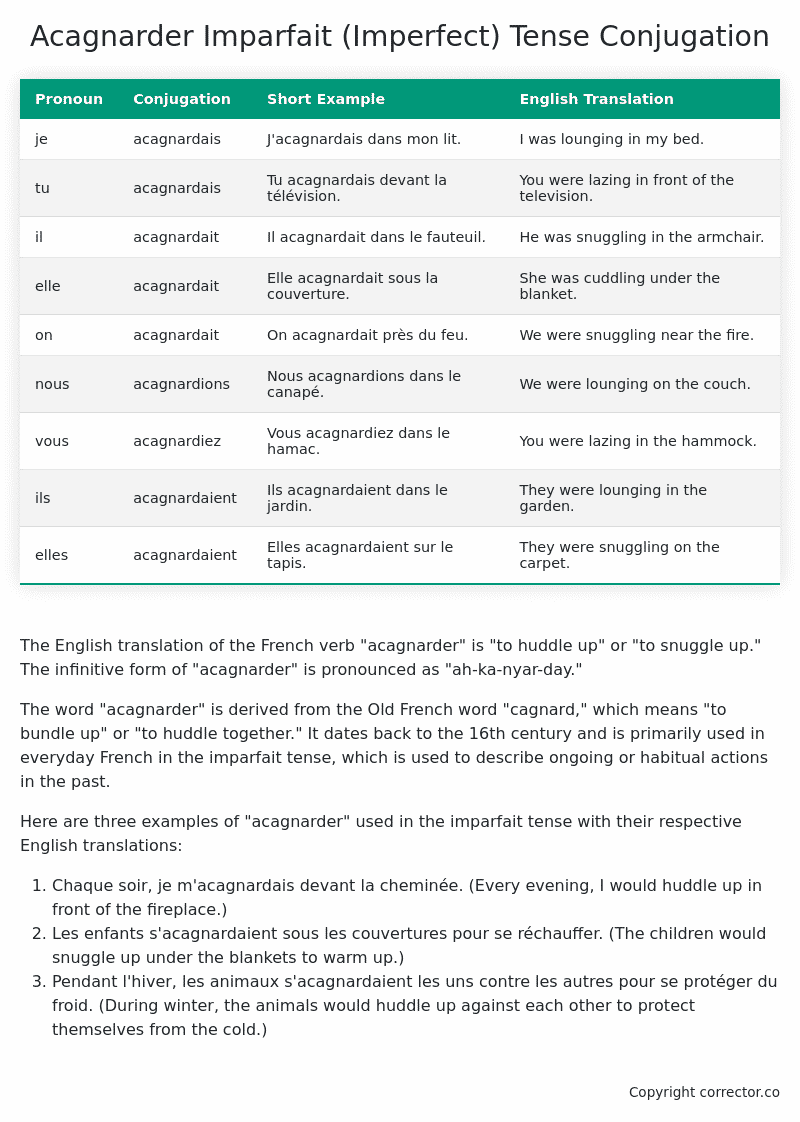Imparfait (Imperfect) Tense Conjugation of the French Verb acagnarder
Introduction to the verb acagnarder
The English translation of the French verb “acagnarder” is “to huddle up” or “to snuggle up.” The infinitive form of “acagnarder” is pronounced as “ah-ka-nyar-day.”
The word “acagnarder” is derived from the Old French word “cagnard,” which means “to bundle up” or “to huddle together.” It dates back to the 16th century and is primarily used in everyday French in the imparfait tense, which is used to describe ongoing or habitual actions in the past.
Here are three examples of “acagnarder” used in the imparfait tense with their respective English translations:
- Chaque soir, je m’acagnardais devant la cheminée. (Every evening, I would huddle up in front of the fireplace.)
- Les enfants s’acagnardaient sous les couvertures pour se réchauffer. (The children would snuggle up under the blankets to warm up.)
- Pendant l’hiver, les animaux s’acagnardaient les uns contre les autres pour se protéger du froid. (During winter, the animals would huddle up against each other to protect themselves from the cold.)
Table of the Imparfait (Imperfect) Tense Conjugation of acagnarder
| Pronoun | Conjugation | Short Example | English Translation |
|---|---|---|---|
| je | acagnardais | J’acagnardais dans mon lit. | I was lounging in my bed. |
| tu | acagnardais | Tu acagnardais devant la télévision. | You were lazing in front of the television. |
| il | acagnardait | Il acagnardait dans le fauteuil. | He was snuggling in the armchair. |
| elle | acagnardait | Elle acagnardait sous la couverture. | She was cuddling under the blanket. |
| on | acagnardait | On acagnardait près du feu. | We were snuggling near the fire. |
| nous | acagnardions | Nous acagnardions dans le canapé. | We were lounging on the couch. |
| vous | acagnardiez | Vous acagnardiez dans le hamac. | You were lazing in the hammock. |
| ils | acagnardaient | Ils acagnardaient dans le jardin. | They were lounging in the garden. |
| elles | acagnardaient | Elles acagnardaient sur le tapis. | They were snuggling on the carpet. |
Other Conjugations for Acagnarder.
Le Present (Present Tense) Conjugation of the French Verb acagnarder
Imparfait (Imperfect) Tense Conjugation of the French Verb acagnarder (You’re reading it right now!)
Passé Simple (Simple Past) Tense Conjugation of the French Verb acagnarder
Passé Composé (Present Perfect) Tense Conjugation of the French Verb acagnarder
Futur Simple (Simple Future) Tense Conjugation of the French Verb acagnarder
Futur Proche (Near Future) Tense Conjugation of the French Verb acagnarder
Plus-que-parfait (Pluperfect) Tense Conjugation of the French Verb acagnarder
Passé Antérieur (Past Anterior) Tense Conjugation of the French Verb acagnarder
Futur Antérieur (Future Anterior) Tense Conjugation of the French Verb acagnarder
Subjonctif Présent (Subjunctive Present) Tense Conjugation of the French Verb acagnarder
Subjonctif Passé (Subjunctive Past) Tense Conjugation of the French Verb acagnarder
Subjonctif Imparfait (Subjunctive Imperfect) Tense Conjugation of the French Verb acagnarder
Subjonctif Plus-que-parfait (Subjunctive Pluperfect) Tense Conjugation of the French Verb acagnarder
Conditionnel Présent (Conditional Present) Tense Conjugation of the French Verb acagnarder
Conditionnel Passé (Conditional Past) Tense Conjugation of the French Verb acagnarder
Conditionnel Passé II (Conditional Past II) Tense Conjugation of the French Verb acagnarder
L’impératif Présent (Imperative Present) Tense Conjugation of the French Verb acagnarder
L’impératif Passé (Imperative Past) Tense Conjugation of the French Verb acagnarder
L’infinitif Présent (Infinitive Present) Tense Conjugation of the French Verb acagnarder
L’infinitif Passé (Infinitive Past) Tense Conjugation of the French Verb acagnarder
Le Participe Présent (Present Participle) Tense Conjugation of the French Verb acagnarder
Le Participe Passé (Past Participle) Tense Conjugation of the French Verb acagnarder
Struggling with French verbs or the language in general? Why not use our free French Grammar Checker – no registration required!
Get a FREE Download Study Sheet of this Conjugation 🔥
Simply right click the image below, click “save image” and get your free reference for the acagnarder present tense conjugation!

Acagnarder – About the French Imparfait Tense
NOTE: To take a deep dive into all the French tenses then see our article on Mastering French Tense Conjugation.
Formation of the Imparfait Tense
For regular -er verbs:
For regular -ir verbs
For regular -re verbs
Common Everyday Usage Patterns
Description of Past Habits
Background Information
Mental and Emotional States
It’s employed to express emotions, thoughts, or physical sensations in the past. For example: “J’étais content quand il est arrivé.” (I was happy when he arrived.)
Ongoing Actions
Points to Note About the Imparfait Tense
Passé Composé vs. Imparfait
Conditional
Si Clauses
Narration
I hope you enjoyed this article on the verb acagnarder. Still in a learning mood? Check out another TOTALLY random French verb imparfait conjugation!


